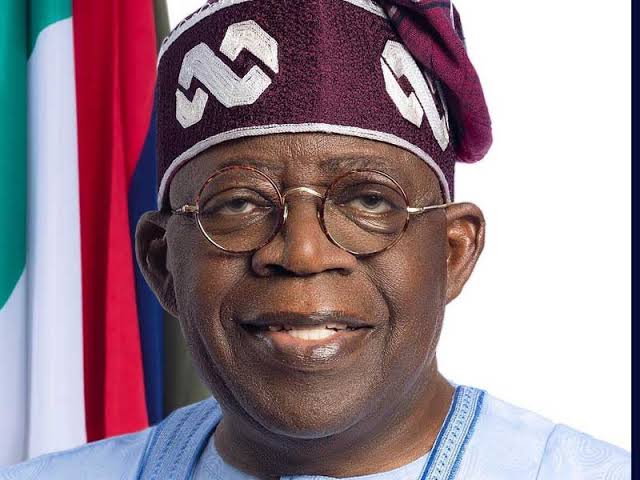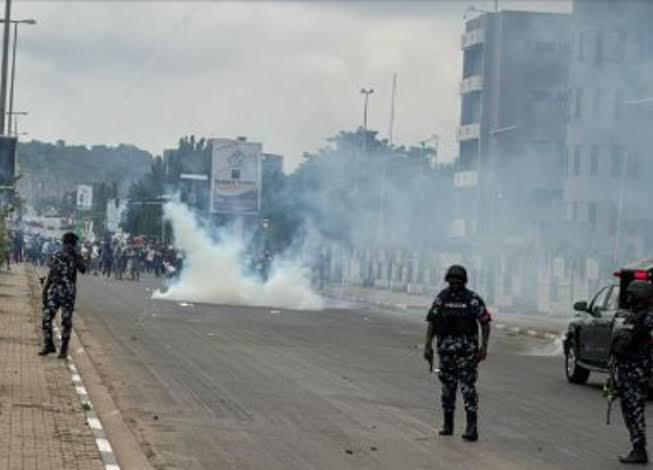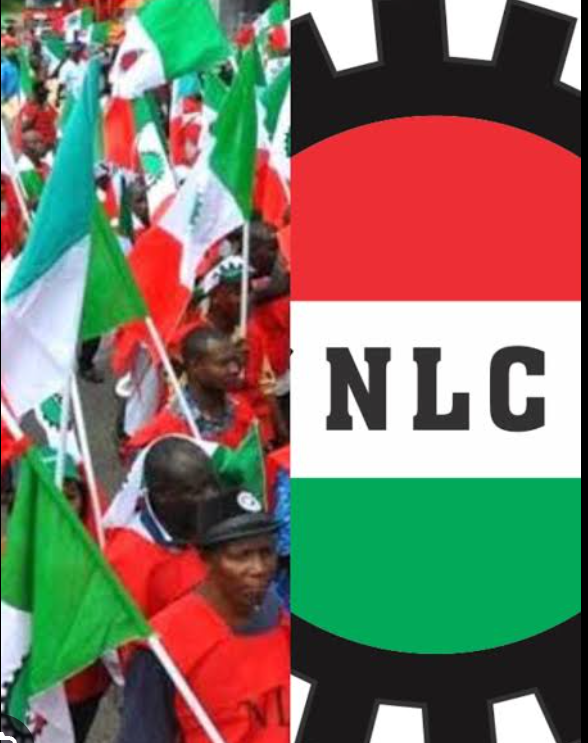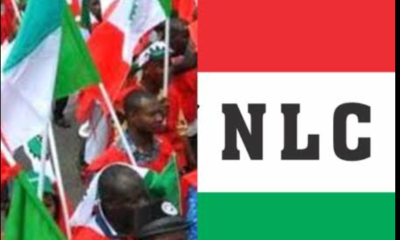News
Rivers: Settle your dispute in court, Tinubu tells Fubara, others

President Bola Tinubu has called on Governor Siminalayi Fubara, political leaders and their supporters in Rivers State to exercise restraint and uphold the rule of law.
In response to recent tensions following last Saturday’s local government council election, the President expressed deep concern over reports of arson and explosions in the state.
He urged all political actors to de-escalate the situation and discourage their supporters from engaging in violence or destructive actions.
President Tinubu directed the police to restore and maintain peace, law, and order immediately.
While instructing law enforcement agencies to bring the situation under control, he emphasised the need to ensure the security of public institutions.
President Tinubu said government facilities built with public funds must be safeguarded from vandalism.
He stressed that self-help has no place in a democratic system, especially after 25 years of continuous democracy.
According to President Tinubu, the judiciary can settle all political disputes, and the outcome of this election should be no exception.
News
Insecurity! Final Year Poly Student Shot Dead by Vigilante

A final-year student of the Delta State Polytechnic, Ogwashi-Uku, has been reportedly shot dead by a vigilante operative.
The unfortunate incident occurred on Tuesday at about 9:00 o’clock in the morning.
According to the report, the deceased, who was a student of the Department of Laboratory Science Technology (ND), was in his apartment studying for an examination he had to write by 1:00 pm the same day when the incident occurred.
It was said that the vigilante operative, who was in his own apartment opposite the room of the deceased, shot and killed the student instantly.
However, upon his arrest, the vigilante said he mistakenly pointed a loaded gun towards the deceased’s room as he tried to pick something from the ground inside his own room and accidentally pulled the trigger.
Meanwhile, police in Oghara have arrested the suspect and deposited the corpse of the victim in a morgue.
The Police Public Relations Officer of the Delta State Police Command, SP Bright Edafe, confirmed the incident to newsmen.
News
SAD! World’s oldest person passes away at 116

The world’s oldest person, a Brazilian nun named Inah Lucas, has died at the age of 116, barely months after assuming the global title.
Her death was confirmed on Wednesday by her religious order and longevity researchers.
Lucas passed away in Porto Alegre, Brazil, where the Congregation of Teresian Sisters expressed gratitude “for the dedication and devotion” she had shown throughout her life of service.
Born on June 8, 1908, Lucas had become the world’s oldest living person in January following the death of 116-year-old Japanese woman, Tomiko Itooka.
She became a nun in 1934, at the age of 26, during the years between the two World Wars.
Her remarkable life drew attention from longevity experts and religious communities alike.
In a tribute, LongeviQuest described her as a frail child at birth, “Many doubted she would survive.”
Despite those early odds, Canabarro lived for over a century, often attributing her long life to her faith.
“He is the secret of life. He is the secret of everything,” she once said, referring to God.
In 2018, on her 110th birthday, she received a papal blessing from Pope Francis, who himself passed away last Monday at age 88.
While Canabarro had personally claimed her birthdate as May 27, 1908, researchers say otherwise.
“Her documented birth date according to records is June 8, 1908,” Gerontological Research Group director Robert Young stated in January.
LongeviQuest noted that she ranks as the 15th-oldest documented person in human history and the second-oldest nun ever recorded, after Lucile Randon of France, who lived to 118 and died in 2023.
With her passing, the title of world’s oldest living person now goes to Ethel Caterham, a 115-year-old resident of Surrey, England, according to the US-based GRG and the LongeviQuest database.
News
Workers’ suffering: NLC laments on May Day, seeks immediate relief

President of the Nigeria Labour Congress (NLC), Comrade Joe Ajaero, has alleged that workers in the country, including ordinary citizens, are facing a harrowing situation in which the civic space is being gagged and compressed to the extent that people can no longer express themselves freely without security measures being used to curtail them.
He made this known at the 2025 Pre-May Day Lecture, themed “Reclaiming the Civic Space in the Midst of Economic Hardship,” held at the headquarters of the NLC on Wednesday.
“The civic space is being compressed. Even last two weeks or last week, the people came out to protest police stopped them in Port Harcourt and other places. These days, protests are being fought, people are not allowing Nigerians to freely protest.
“Even that of minimum wage and hardship we tried and they tried to stop us. Forces are being used to compress the civic space and if you do that, you match the end to democracy even those sponsoring it will be the potential victims of it.
“I can tell you, all the people there now are beneficiaries of the suffering of some of us, who protested the military stay in office, annulment of June 12 and all that. None of them was known, their names are not even known in their community. If the civic space was closed, none of them will be in National Assembly, none will be a governor today.
“I think they’re having a momentary relief, it’s not going to last. It is the duty of the civil society, the labour movement to make sure that we’ll fight for the civic space to open.”
Ajaero, who noted that student protests have been suppressed and many voices sponsored to work against popular views, said the labour movement in Nigeria would continue to speak truth to power and fight for the rights of Nigerians.
Corroborating Ajaero’s position, the guest lecturer and Professor of International Law, Sir Christopher Chukwuma, stressed the need to review laws and policies—particularly the Cybercrime Act and the Public Order Act—that are restricting and criminalising civic engagement in the country.
Chukwuma expressed concern that the civic space in Nigeria was diminishing, noting that workers and unions no longer had the freedom to express themselves in a country that claims to practise democracy.
He emphasised that a vibrant civic space is essential to the proper functioning of democratic processes.
According to him, democracy in Nigeria is being threatened by corruption, lack of accountability, threats to the lives of civic actors, and the imposition of domestic laws on what he described as “the civic society of decision.”
He said, “We know how they happen in this country. The very moment there is increase in vulnerability and marginalization of certain groups of people, the civic space is dying. There is a problem.”
Chukwuma added that restrictions on peaceful protests, the mobilisation of security forces to threaten those who wish to exercise their rights, control of social media, attacks on media organisations and practitioners, limited access to justice, inadequate protection of human rights defenders, and insults were all threats to the civic space in Nigeria.
He insisted that although economic hardship could suppress the civic space or distract civic actors by shifting their attention to survival, Nigerian workers still have an opportunity to reclaim and revitalise that space.
He said, “There is need for a focus for policy reforms, there should be a need for certain restrictive laws to be amended. The NLC can advocate for changes in certain laws that potentially criminalize civic engagement, such as the Cybercrime Act and the Public Order Act, the NLC can do that.
The NLC can advocate for reforms that prevent excessive force against civic actors and increase transparency and oversight of security agencies, especially towards human rights defenders or activists.
“There is a need to strengthen the workers’ rights and civic empowerment by reviewing and revisiting laws and regulations that make civic space, ensuring they align with international human rights to their standards. This includes revisiting restrictive legislation, such as the Companies and Allied Matters Act, to protect thoughts of civil society organizations and felicitate their operations. The Congress can do that.
“There is need for implementation measures to enhance citizens’ participation in decision-making processes. These can be achieved through the mechanisms such as town hall meetings. It has always been going on, but encouraging to move on. The Media Rights Agenda is still another aspect of civil society organizations. But there can be collaborations where one finds it difficult, the other helps.”
“The need to resuscitate or reclaim the civic space in order to sustain democracy in Nigeria focuses on the experiences we have had from the past administrations, and it highlights the urgent need for safeguarding freedom of expression, strengthening civil society engagement, enhancing transparency and accountability, especially from the leaders, in order to foster dialogue and reconciliation.
“These measures are crucial for nurturing a vibrant democratic environment that will uphold citizen rights, promote inclusivity, and foster the long-term sustainability of democracy in Nigeria.”
-

 News16 hours ago
News16 hours agoJust In: Explosion rocks Borno military barracks
-

 Entertainment17 hours ago
Entertainment17 hours agoWhy Portable was sentenced to three months in prison
-

 News16 hours ago
News16 hours agoCBEX restarts operations despite SEC ban, N1.2tn EFCC investigation
-

 News8 hours ago
News8 hours agoNigerian Banks’ Customers To Pay N6 Per SMS Transaction Alert From Today
-

 News12 hours ago
News12 hours agoZed-Faith Foundation Donates Food, Medical Supplies to Orphanage, Elderly Homes in FCT
-

 News8 hours ago
News8 hours agoNJC slams three judges
-

 News5 hours ago
News5 hours agoWorkers’ suffering: NLC laments on May Day, seeks immediate relief
-

 News16 hours ago
News16 hours agoIbas Pledges Commitment to Workers’ Welfare





